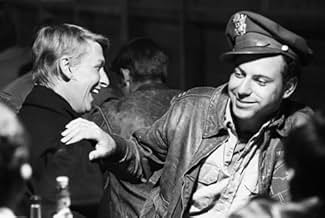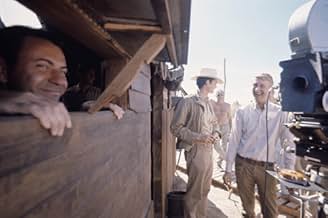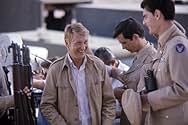A military pilot makes a valiant effort to be certified insane during World War II so that he can be excused from flying missions. But there's a catch.A military pilot makes a valiant effort to be certified insane during World War II so that he can be excused from flying missions. But there's a catch.A military pilot makes a valiant effort to be certified insane during World War II so that he can be excused from flying missions. But there's a catch.
- Nominated for 2 BAFTA Awards
- 6 nominations total
- Nately
- (as Arthur Garfunkel)
- Director
- Writers
- All cast & crew
- Production, box office & more at IMDbPro
Featured reviews
However, upon viewing the film, I was quite impressed and happy with it. I'm not an unrealistic person, so I understand that they had to cut out scenes and characters and subplots to condense it for the film. Overall, of course, it lost some of its greatest moments which are in the ironic humor of the narrative style of the book. But it was not a bad film at all. In fact, I thought it was one of the best adaptations I have seen. I think almost everything you see on screen happens in the book.
Apart from that, it was extremely well casted. The characters were just as I have envisioned them in my head while reading the novel (except that Major Major shrank about a foot... but that's not matter, because Bob Newhart was great anyway). The cinematography was beautiful, the acting was awesome (Alan Arkin was perfect), and the flashbacks to Snowden were done stylishly and surrealistically.
Basically, it's a good movie. But it's an even better movie if you've read the book, and you know exactly what is going on in some of the characters' heads and what is going on outside of the scenes we see in the film. Overall, I think this is the best anyone could have done with this adaptation, and I applaud the filmmakers for that.
I've seen the film with people who did not read the book, and some unaware of the book, and I think most had very positive impressions of it. Yes the book is a more fulfilling experience, but that is almost always the case. I understand that the film disappointed when it opened and all the stars ended up despising each other. I think that reaction tainted the film for several years. I think that the film has appreciated with age and really stands today as a great underrated piece of work. I think at some point if will be rediscovered and be placed among the best black comedy/farce/war movies of its time.
Usually the answer is that the film is a poor evocation of the book. It is, of course; films are fundamentally different beasts than books, so the closest one comes is to have congruence of story. But the story is the least important element of either fine books or movies. No intelligent viewer looks for sameness in an adaptation.
I think the reason is simple. We are happy to accept war as heroic. Deep down, that's what we believe; whether as an inescapable fact of evolution or of chauvanistic indoctrination. Against this backdrop, we apply the stuff of our apparent convictions: that war is funny (MASH, the escape movies) or grossly brutal and confusing (Platoon, the first part of Pvt Ryan-- which then reverts to the noble). We just cannot accept the view that war comes from stupidity and selfishness, because it convinces that we, all of us every one is at root stupid and selfish.
This movie is so good, it convinces of that fact, and that's why no one wants to watch it. So no one is convinced. That's the catch.
One finds this enthusiasm understandable upon first reading of this classic novel (and it is a classic though it is a mess -- which is part of its charm). It is simultaneously funny and tragic, and this material fits naturally with the cinematic talents of Buck Henry and Mike Nichols. They achieve the same tone as Heller's book, but with requisite condensation (even if this film had been twice as long, it wouldn't have been able to capture everything in the book, which is not a condemnation).
The book runs in circles chronologically; so does the film. The book repeats the Catch 22 theme on almost every page (it is certainly the focus of most dialogue); the film isn't as rife with its references but is more explicit when invoking the Catch.
The tragedy of Snowden is a dramatic focal point for both; unfortunately, the film builds it up more (due to its comparative brevity) but falls short in explicating the relevance.
Fortunately the adaptation works incredibly well on several levels. In terms of characterization, Alan Arkin IS Yossarian, Anthony Perkins IS Chaplain Tappman, and Bob Newhart IS Major Major (albeit briefly). The dialogue, which closely follows the novel for the most part, works as well orally as in the written form. And the insanity of war, which underlies all of the book, is well represented.
As a creative work, this film is impossible to divorce from the book, which is difficult to say about many adaptations. As a creation of its own, it suffers some without knowledge of the base material, and as an adaptation of that material it is bound to disappoint fans of the original. There's that Catch again. Viewed with a balance between the two positions (if that's possible), it works extremely well and shows its depth with each viewing in the same way the book does with each reading.
Storyline
Did you know
- TriviaSecond unit director John Jordan refused to wear a harness during a bomber scene. While giving a hand signal to another airplane from the tail gunner position in the camera plane, he lost his grip and fell 4,000 feet to his death.
- GoofsWhen Major Major begins talking to Sgt. Towser in his office about when others can see him, a portrait of Franklin D. Roosevelt can be seen hanging on the wall behind his desk. Major Major then walks away from, then back to his desk twice more, and each time the portrait is seen, it has changed - from Franklin D. Roosevelt to Winston Churchill to Joseph Stalin.
This was an inside joke, done intentionally by the filmmakers to further emphasize the dream-like state of the film.
- Quotes
Old man in whorehouse: You see, Italy is a very poor, weak country and that is what makes us so strong, strong enough to survive this war and still be in existence, long after your country has been destroyed.
Capt. Nately: What are you talking about? America is not going to be destroyed.
Old man in whorehouse: Never?
Capt. Nately: Well...
Old man in whorehouse: Rome was destroyed. Greece was destroyed. Persia was destroyed. Spain was destroyed. All great countries are destroyed. Why not yours? How much longer do you think your country will last? Forever?
Capt. Nately: Well, forever is a long time, I guess.
Old man in whorehouse: Very long.
- ConnectionsFeatured in Film Extra: Richard Benjamin (1973)
- SoundtracksThe Stars and Stripes Forever
(uncredited)
Written by John Philip Sousa
(played by military band in the final scene)
- How long is Catch-22?Powered by Alexa
Details
Box office
- Budget
- $18,000,000 (estimated)
- Runtime2 hours 2 minutes
- Color
- Sound mix
- Aspect ratio
- 2.39 : 1
Contribute to this page







































